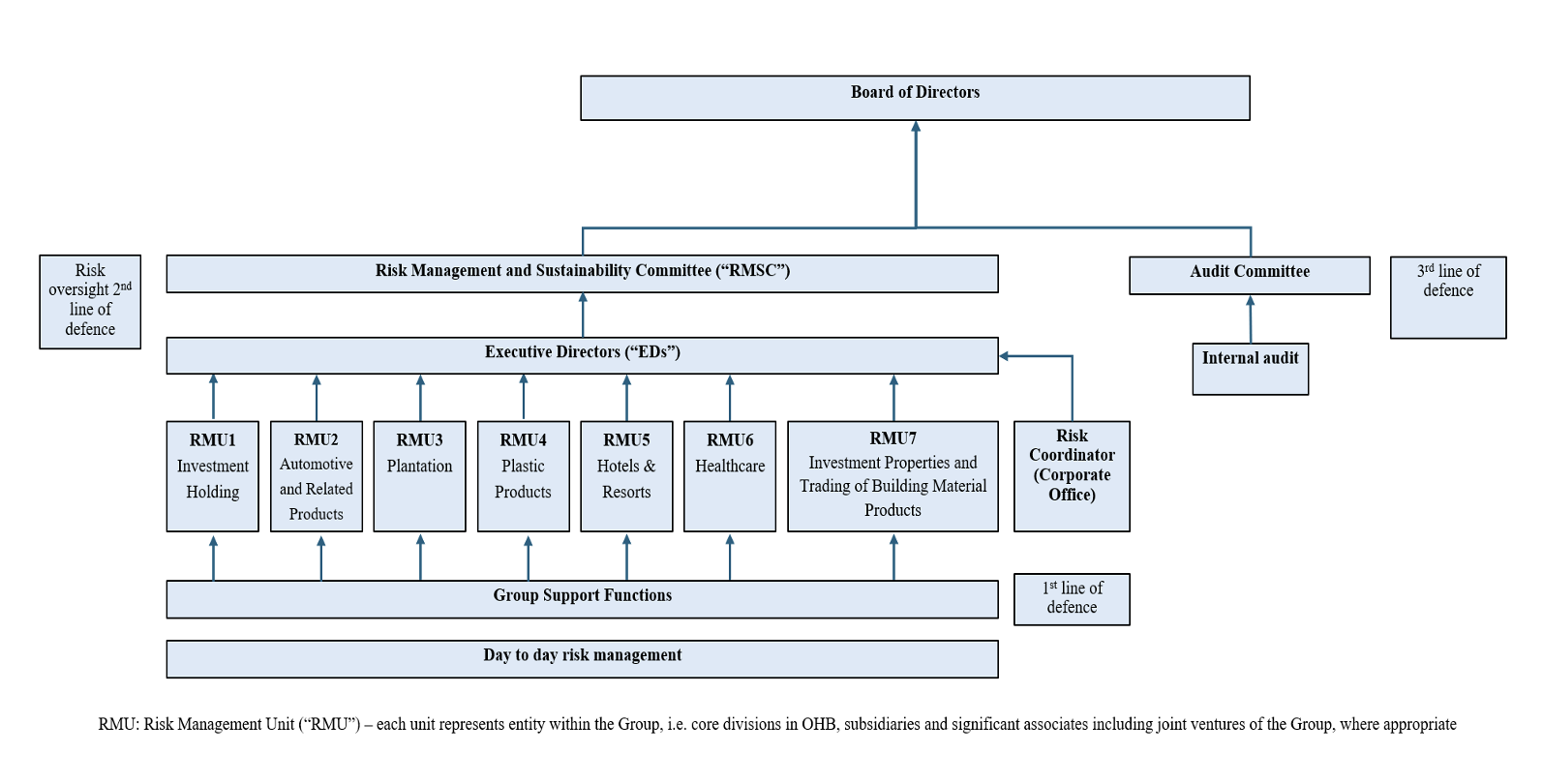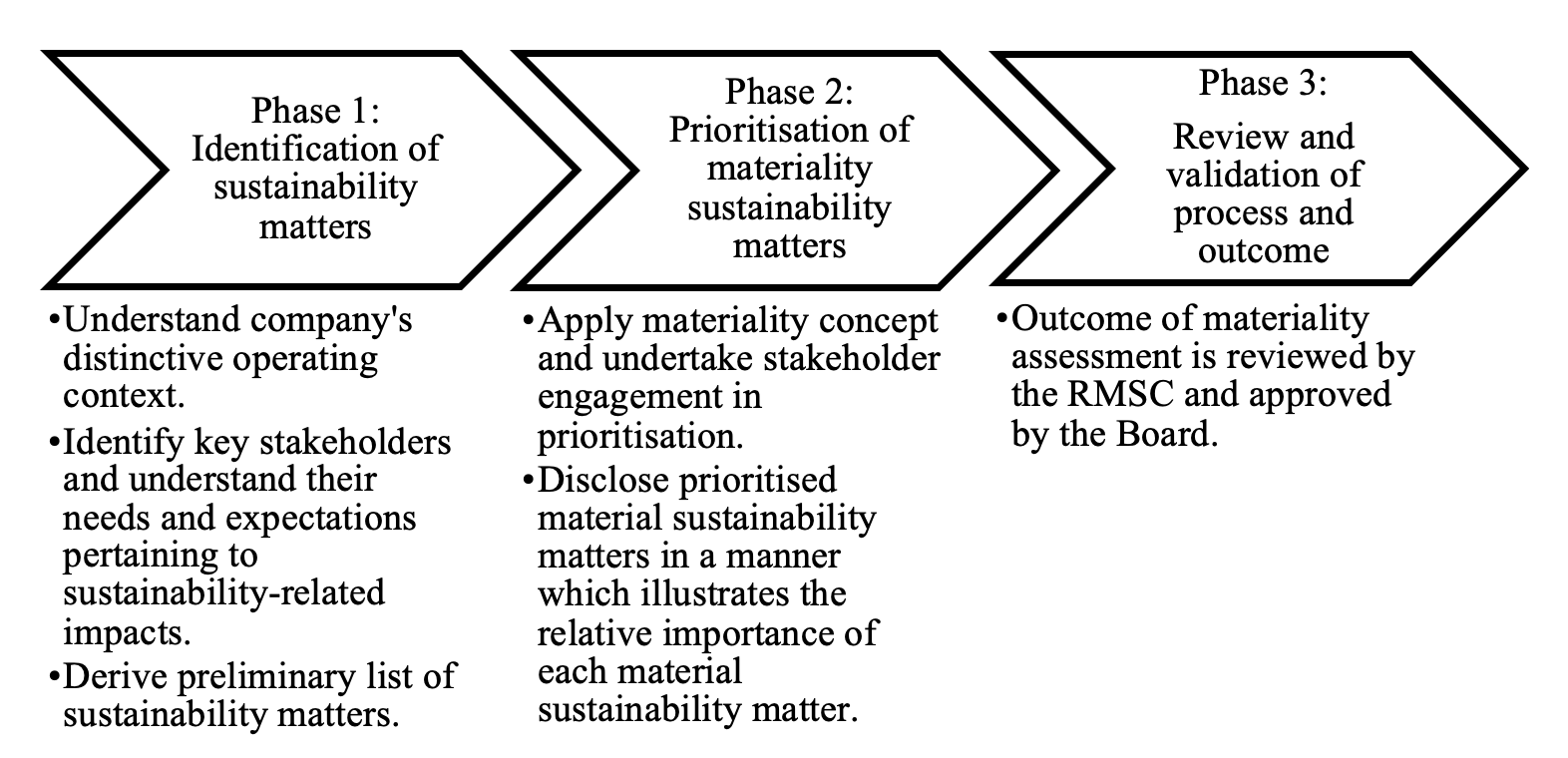Investor Relations
Home > Sustainability Policy
Sustainability Policy
Objective
Oriental Holdings Berhad and its subsidiaries (the “OHB Group” or the “Group” or the “Company”) are committed to promoting sustainability. Our Sustainability Policy refers to a ‘Statement of Intent’ for the purpose of communicating to employees, customers, distributors and other stakeholders our commitment to promote good sustainability practices.
At OHB Group, we are committed to continually improving the integration of sustainability into our working environment and business processes. We are committed to accountability and transparency in our sustainability performance. Our Sustainability Policy is based upon the following principles:
- to observe and comply with all relevant legislation, regulations and codes of practice;
- to consider sustainability risk and opportunities and integrate these considerations into our business decisions;
- to promote and ensure that all employees are aware of, and are committed to, implementing and measuring sustainability activities as part of the Group’s strategy, taking into consideration environment, social and governance aspects; and
- to review, report and continuously strive to improve our sustainability performance.
Sustainability Framework
OHB's sustainability framework is built around four key pillars: Economic Sustainability, Environmental Sustainability, Social Responsibility, and Governance Sustainability. Each of these pillars forms the basis of our commitment to sustainable growth. We employ both corporate strategy and feedback from internal and external stakeholders to define these areas of focus.
Economic Sustainability
At OHB Group, we aim to create long-term economic value for all stakeholders by constantly review our business practice, ensuring sustainable growth, and enhancing the overall performance of our business segments.
Our approach to economic sustainability is guided by several key principles:
- Constantly review OHB’s business practices to facilitate the delivery of economic performance; and
- Strike a balance between business performance and contributions to the economy with specific strategic actions implemented at sector-level.
Enviromental Sustainability
At OHB Group, we strive to reduce our environmental footprint by adopting best practices in our daily operations, monitoring our performance against key indicators, and taking appropriate corrective action when necessary to reduce our environmental impact. The following are our initiatives:
- Take proactive approach to environmental issues by developing in-house policies and procedures, establish strategic committees, conduct impactful training programmes aiming for continued compliance;
- Enhanced OHB’s reputation as a responsible and forward-thinking organization by meet and exceed regulatory expectations and stakeholder demands; and
- Tasking management team in monitoring environmental performance and instilling a culture of eco-consciousness and environmental responsibilities in their leadership.
Social Sustainability
In OHB Group, we consider our people to be our greatest asset, and we strive to provide them with adequate support, protection and growth opportunities at workplace. We believe that the Group’s success and growth should bring meaningful impact to the communities in which we conduct our business. Therein, the Group incorporates in its business operations by way of the following:
- Ensure compliance with local laws and regulations;
- Encourage and support all employees to actively ensure that the work environment is void of any form of harassment and where every employee is treated fairly and with respect;
- Nurture a work environment that helps build a diverse work force which contributes to the highest potential and commits to a harassment free work environment;
- Believe in creating an inspiring workplace, committing to developing our people and giving them the right skills to help deliver our business strategy; and
- Engage with stakeholders, including customers, suppliers, contractors, unions, NGOs and governments, committing to making a positive social and economic impact and understanding and managing any negative impacts of our business operations.
Governance Sustainability
The Group believes that good governance is more than just a pursuit towards complying with all the prescripts but that it translates into better business performance and creates a more sustainable value for the Group by way of the following:
- Adhere to the requirements of all laws and regulatory requirements, standards and better practices to which the Group subscribes and establishes;
- Adopt high ethical values and ensure these practices are upheld across our business through our code of ethics and employee training programmes;
- Establish and nurture open, honest and timely communications, and being responsive to concerns;
- Establish a comprehensive enterprise-wide risk management framework, which includes a process to identify, evaluate and manage risks faced by the Group in its pursuit of its business objectives and strategies;
- Establish emergency response plans to ensure official, coordinated and fully-resourced response and control measures can be activated to meet the specific needs of all emergency situations within the site of our operations, communities and transportation routes in the event of emergency;
- Establish shareholders communication policy which allows the Group to effectively communicate with its shareholders, prospective investors, stakeholders and the general community, including maintaining a dedicated website which facilitates easy access to corporate information, annual reports and Group announcements; and
- Establish robust policies and procedures to ensure the adequacy and integrity of the Group’s internal control system and management information systems, including systems for compliance with applicable laws, regulations, rules, directives, and guidelines.
Sustainability Governance Structure

Stakeholder Engagement
Stakeholder engagement is the structured process by which OHB actively involves relevant stakeholders to achieve mutually beneficial outcomes. It serves as a critical accountability mechanism, ensuring that stakeholders are integral in identifying, understanding, and addressing material sustainability issues. This engagement enables transparent communication, providing clear explanations for decisions, actions, and overall performance.
Our sustainability priorities, established within the framework of the four sustainability pillars, are continuously reviewed and re-evaluated through stakeholder engagement and materiality assessment processes. This ensures that our sustainability efforts remain relevant, meet stakeholder expectations, and align with the Group’s strategic objectives.
Materiality Assessment
Undertaking a robust materiality assessment process is essential for the systematic identification as well as prioritisation of sustainability matters that are most material to the company and its stakeholders. It involves identifying and assessing a wide range of sustainability matters, and refining them to focus on what is most important.
Our materiality assessment process is made up of three (3) distinctive phases as below:

Materiality Matrix
A Materiality Matrix is a tool used in sustainability reporting and corporate governance to prioritize issues based on their significance. It maps two key dimensions: importance to stakeholders and impact on the organization’s ability to achieve business objectives and long-term value creation.
Building on the materiality assessment, the Materiality Matrix visually represents the prioritized material sustainability matters, highlighting their relative importance to one another. This allows stakeholders to gain a deeper understanding of the company’s focus, resources, and efforts in addressing key sustainability challenges and opportunities.
Sustainability Matters
Sustainability Matters refer to the risks and opportunities arising from the sustainability impacts of a company’s operations and activities. As a global conglomerate, it is essential for us to determine key sustainability matters that are material to our organization and operations. These matters are carefully aligned with Bursa Malaysia’s common sustainability matters, while also tailored to address the unique operational needs of our business.
Sustainability Performance Indicators
Sustainability performance indicators (“SPIs”) are metrics used to measure a company’s progress in managing environmental, social, and governance impacts. These indicators are crucial for enhancing accountability and driving improvements in sustainability performance. The identified SPIs shall be submitted to the EXCO on a quarterly basis, as deemed necessary.
Administration
This policy shall be reviewed periodically to ensure that it is always consistent with the business and market environment that OHB is operating in or faced with.
 OHB SUSTAINABILITY POLICY (PDF)
OHB SUSTAINABILITY POLICY (PDF)
